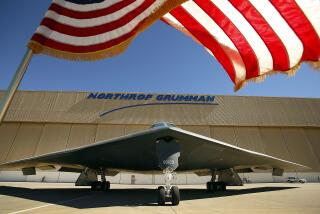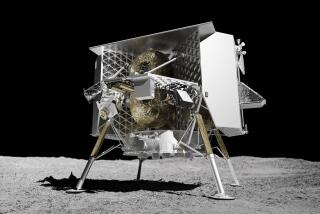High Risks Hit Home at McDonnell
- Share via
At McDonnell Douglas Corp. in Huntington Beach on Tuesday morning, the tragic news arrived by telephone.
“One engineer’s wife called and said, ‘Did you hear?’,” Mel Lewin, solid rocket booster structures project manager, said. “Then it spread like wildfire.”
And so, beginning with a telephone call, then spreading by word of mouth through the offices, corridors and assembly areas of the plant, word passed that the 25th space shuttle mission had ended in tragedy.
For 10 years at the location, McDonnell Douglas has manufactured the major structural elements that hold together the two solid-fuel rocket boosters used on all space shuttle flights. Lewin has been with the project since 1978.
“It’s devastating,” Lewin said in an interview less than two hours after the explosion that destroyed the space shuttle Challenger.
From 200 to 300 full- and part-time engineers, welders, assemblers, sealers, machinists and planners are involved in manufacturing the rocket booster parts, a company spokesman said. The booster motor and other components are made by other manufacturers.
“It does not seem conceivable to me,” Lewin said, that any of the components manufactured at the Huntington Beach plant could have contributed to the explosion.
He characterized the components as “strictly dumb hardware . . . with no moving parts.”
Each of the aluminum and steel pieces--the forward and aft skirts, nose cone, attaching rings and the frustum, the part that contains a parachute to slow the burned-out rocket after it separates from the shuttle--has been in space on prior flights and functioned properly, Lewin said.
“I didn’t see anybody crying, (but) I saw many very (watery) eyes,” Lewin said of the workers on the job Tuesday.
As a security guard lowered the plant’s U.S. flag outside to half staff, Lewin added: “It’s dreadful when it happens, but it’s part of the price that has to be paid to do the things this country wants to do. It’s something you don’t like to admit the possibility of happening.”
Perhaps, Lewin suggested, NASA could better prepare the American public in dealing with the possibilities of tragedy and death in space exploration.
“When you get right down to it, this is a high-risk business and it’s going to happen sooner or later.”
Nevertheless, he said, “it’s not a happy day.”
More to Read
Sign up for Essential California
The most important California stories and recommendations in your inbox every morning.
You may occasionally receive promotional content from the Los Angeles Times.




![Vista, California-Apri 2, 2025-Hours after undergoing dental surgery a 9-year-old girl was found unresponsive in her home, officials are investigating what caused her death. On March 18, Silvanna Moreno was placed under anesthesia for a dental surgery at Dreamtime Dentistry, a dental facility that "strive[s] to be the premier office for sedation dentistry in Vitsa, CA. (Google Maps)](https://ca-times.brightspotcdn.com/dims4/default/07a58b2/2147483647/strip/true/crop/2016x1344+29+0/resize/840x560!/quality/75/?url=https%3A%2F%2Fcalifornia-times-brightspot.s3.amazonaws.com%2F78%2Ffd%2F9bbf9b62489fa209f9c67df2e472%2Fla-me-dreamtime-dentist-01.jpg)








